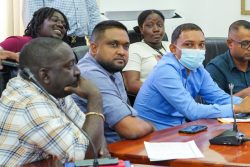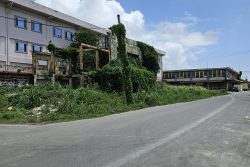In circumstances where members of the public do not feel safe in their homes or on the streets, it might have been thought that the Police Service Commission and the President within the ambit of their respective spheres of authority, would give careful consideration to senior appointments in the GPF. It would be expected, for example, that officers at the highest levels of the Force would be selected on the basis of their record and/or evident competence, and as such citizens could have some confidence that they had the ability to make a dent in the serious crime rate.
It may be, of course, the powers-that-be have persuaded themselves that last December’s announcement of a reduction in that rate, particularly where murders were concerned, would have calmed public anxiety, but if there was some initial modest optimism, it was subsequently cancelled out by the reality. If citizens still do not feel safe from crimes of violence, it is not their imagination; they really are not safe. What has happened since then is that the method by which police statistics are compiled has come into question, and now everyone simply ignores them.
So the Minister of Home Affairs and the police can forget the statistics and turn their attention full-time to approaches and techniques for combating crime. Their task presupposes that they have the right people in the right posts. Three days ago we reported that former SOCU officer, Superintendent Krishnadat Ramana had been appointed as the new Commander of Division 4C, taking over from Senior Superintendent Khali Pareshram. In that report we said that Superintendent Ramana had been tipped to become the new Traffic Chief, but when asked about this he directed this newspaper to acting Commissioner of Police Clifton Hicken. Efforts to contact him were not successful.
Superintendent Ramana came to public notice when he was still a member of SOCU and had instituted the arrest of an attorney-at-law, Ms Tamieka Clarke, when she was representing a client who was being held at SOCU headquarters. She had advised the client not to answer any questions, but subsequently, Superintendent Ramana had said that he was required to provide a statement. Ms Clarke had responded that her client would be exercising his constitutional right to remain silent, and in an affidavit she related how the Superintendent had then asked her whether she was aware of what “obstruction” meant, and that her client was “compellable” in terms of providing a statement. Furthermore, the affidavit went on to say, she was told that if she prevented him from supplying a statement, she would be arrested. The Superintendent’s words were, she said, “Counsel may need counsel.”
In brief, Ms Clarke was subsequently arrested, an act which was unconstitutional and was later deemed to be so by Chief Justice Roxane George. It has been reported that the attorney was released following the intervention of Attorney General Anil Nandlall after it came to his ears. Be that as it may, what is extraordinary is that someone at the Superintendent’s level either was unfamiliar with a very basic law, or alternatively, was familiar with it and just chose to disregard it. Whatever the case, prima facie he would not seem to be an obvious candidate for appointment to run Division 4C, which as a starting point requires a good grasp of the law in general as well as the constitution, and a commitment to apply that law without fear or favour. There is no suggestion either in the course of this incident that his interpersonal skills are worthy of notice, and these are something which a divisional commander would need when interacting with the public.
It may well be that Superintendent Ramana has acquired useful skills and experience from his time at SOCU, but on the evidence of his actions last year, which invited criticism not just from local legal sources but international ones as well, it might seem that these might be more usefully employed in a different department than Division 4C. Exactly who made this appointment – whether the Police Service Commission or someone to whom they delegated the power, such as one of their number or the Police Commissioner – has not been reported, and as was said earlier, Mr Hicken was uncontactable. The public will wonder, however, what recommended Mr Ramana in particular for the post, and who the alternatives were.
On Tuesday we reported there had been no formal announcement by the police of Superintendent Ramana’s appointment, but there was a Facebook post showing him on an outreach at Lusignan market.
Two weeks earlier there had been another announcement in relation to the police, this time concerning acting Commissioner Clifton Hicken. He has now reached the age of retirement, but has had his tenure in the post extended by President Irfaan Ali. The procedures for appointing a Commissioner of Police and deputies are different from those applying to divisional commanders. The constitution requires that the head of state consults with both the opposition leader and the chairman of the Police Service Commission before a commissioner of police can be appointed. At the time the President made the acting appointment, Mr Nigel Hoppie the former incumbent had retired, and there was no Leader of the Opposition or chairman of the Police Service Commission in place. He therefore resorted to the Doctrine of Necessity to make the acting appointment of Mr Hicken.
The opposition then mounted a legal challenge to the appointment on the main grounds that the Leader of the Opposition had not been consulted in conformity with constitutional requirements, but
Chief Justice George ruled that Mr Hicken had been lawfully appointed, because among other things, there was no opposition leader in place at the material time.
So now we come to his extension, which is for a period yet to be determined. Questions have again been raised about the legality of the President’s decision, although the Attorney General has denied what he has done is illegal. The law aside, what is of interest to the public is how effective the Commissioner has been during his period as head of the Force, and the answer is, not very impressive.
In addition to other things there was the beating of vendors and the looting of their stalls at Mon Repos during the Quindon Bacchus protest in June last year, when the police were accused of doing nothing. It was something which should have been foreseen, although the police hierarchy made no preparations for the march taking on a violent character.
While the Commissioner likes to recite the ‘improvement’ in the violent crime statistics, he has admitted to an increase in fatalities on the roads. It was reported he held an impromptu meeting with traffic personnel telling them, among various other things, that enforcement must be done day and night and they must cease constantly stopping motorists asking for documents unless the operation was being supervised by an officer.
What he did not mention was corruption in this sector, at least not for public consumption, but in a different theatre of operations, the shortcomings of the police in relation to their own transgressions was a matter which did concern Chairman of the Police Complaints Authority Justice William Ramlal. He set out his complaints in his 2022 report, which was tabled in Parliament recently. In particular he accused the Police Commissioner of violating the Police Complaints Authority Act, namely Sections 12, 13, 14 and 15, and recommended that the President see that this is stopped. “It is my recommendation that His Excellency the President makes it clear to the Commissioner of Police that he cannot continue to violate the law…” he wrote.
The Commissioner himself was contacted for a response by this newspaper, and said he would, but up to the time of the report had not yet done so. His breach of the law clearly has not been a source of disquiet to President Ali given the extension he has been granted. The government should be careful. If it conveys the impression that when the custodians of the law whether at a superintendent’s level or at the level of a commissioner break that law, it is not a major issue, then the public will never have confidence in the police.
The government still has not grasped that a professional force cannot be created out of a compromised, politicised entity.








